新人教版PEP五年级英语上册复习资料(全)
2023年人教版(PEP)五年级英语上册总复习要点

五年级英语上册总复习要点PEP英语五年级上册四会单词词汇表Unit 1:young 年轻的 funny 滑稽可笑的tall 高的 strong 强壮的kind 和蔼的old 年老的helpful 有用的thin 瘦的Mr 先生like 像、喜欢strict 严格的clever 聪明的 polite有礼貌的quiet 安静的Unit 2:Mondy 星期一Tuesday 星期二Wednesday 星期三Thursday 星期四Friday 星期五Saturday 星期六Sunday 星期天have 有、吃 on 在…..时候do homework 做作业watch TV 看电视read books 读书wash my clothes洗我的衣服play football踢足球Unit 3:三明治 sandwich fish 鱼salad 沙拉冰激淋 ice cream potato 土豆tomato 西红柿for 为lunch 中餐sweet 甜的hot辣的fresh 新鲜的favourite 最喜欢的fruit 水果healthy健康的delicious可口的tea茶五年级上册四会句子:1.谁是你的英语老师?王老师。
Who’s your English teacher?Mr Wang .2.他长得什么样?他(是)高而强壮。
What’s he like ?He’s tall and strong . 3.她很安静吗?不是的。
她很活跃的。
Is she quiet ?No, she isn’t. She’s very active.4.她很严格么?是的,但她很和蔼的。
Is she strict ?Yes, she is , but she’s very kind .5 今天星期几?星期二。
What day is it today ?It’s Tuesday.6 星期二你们上什么课?What do you have on Tuesdays ?7 我们上数学和科学课。
期末复习(课件)人教PEP版英语五年级上册

语法
可数名词变复数 有规律的变法 1、一般在词尾加s 2、以s、x、sh、ch结尾的,加es 3、以辅音字母加y结尾的,把y变成i再加es
以元音字母加y结尾的,直接加s 4、以o结尾的,有生命的加es: tomato、potato、hero(英雄爱吃土豆和西红柿)
没有生命的加s 5、以f/fe结尾的,把f/fe变成v,再加es
4、Practice makes perfect. 熟能生巧。
5、East,west,home is best. 金窝银窝,不如自己的狗窝。
6、Seeing is believing. 眼见为实。
形容词
tired 疲倦的 thirsty 口渴的 favourite 特别喜爱的 dirty 脏的 high 高的 wonderful 极好的 next 下一个 Dear 亲爱的
动词
know 知道,了解 finish 完成 learn 学习 send 邮寄 move 搬家 live 居住 speak 说 want 想要 drink 喝
4、询问对方会做什么事并回答 What can you do? I can... 询问对方能否做某事并回答 Can you...? Yes,I can./No,I can’t.
5、描述某处有某物 There is a/an+可数名词的单数+其他. There is+不可数名词+其他. There are+可数名词的复数+其他.
6、询问某处是否有某物并回答 Is there a/an...? Yes,there is./No,there isn’t. Are there...? Yes,there are./No,there aren’t.
新pep人教版五年级英语上册期中复习资料
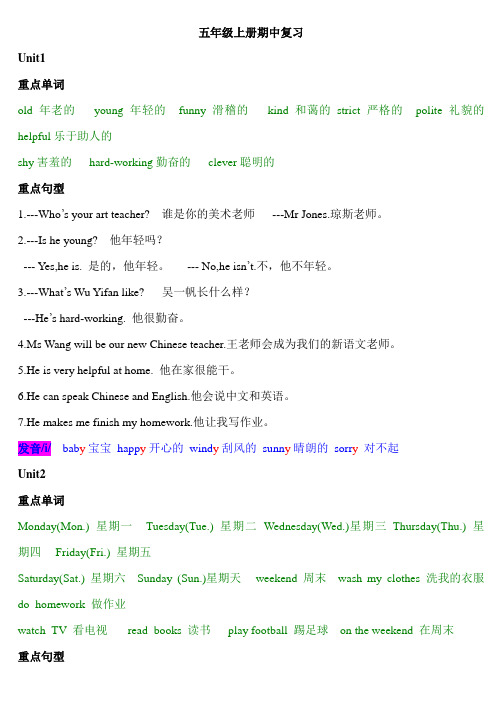
五年级上册期中复习Unit1重点单词old年老的young年轻的funny 滑稽的kind和蔼的strict严格的polite 礼貌的helpful乐于助人的shy害羞的hard-working勤奋的clever聪明的重点句型1.---Who’s your art teacher? 谁是你的美术老师---Mr Jones.琼斯老师。
2.---Is he young? 他年轻吗?--- Yes,he is. 是的,他年轻。
--- No,he isn’t.不,他不年轻。
3.---What’s Wu Yifan like? 吴一帆长什么样?---He’s hard-working. 他很勤奋。
4.Ms Wang will be our new Chinese teacher.王老师会成为我们的新语文老师。
5.He is very helpful at home. 他在家很能干。
6.He can speak Chinese and English.他会说中文和英语。
7.He makes me finish my homework.他让我写作业。
发音/i/bab y宝宝happ y开心的wind y刮风的sunn y晴朗的sorr y对不起Unit2重点单词Monday(Mon.) 星期一Tuesday(Tue.) 星期二Wednesday(Wed.)星期三 Thursday(Thu.) 星期四 Friday(Fri.) 星期五Saturday(Sat.) 星期六 Sunday (Sun.)星期天weekend 周末wash my clothes 洗我的衣服do homework 做作业watch TV 看电视read books 读书play football 踢足球on the weekend 在周末重点句型1.----What day is it today? 今天是星期几---It’s Saturday. 今天星期六。
人教版(PEP)小学英语五年级上册Unit4-6单元期末综合复习课件
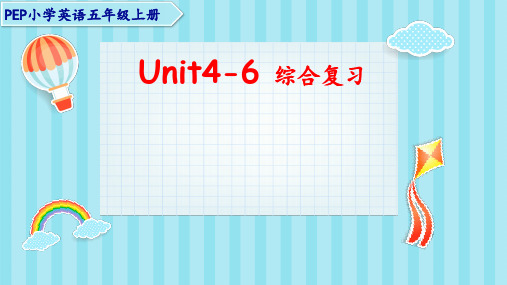
There + isn’t/aren’t +any + 名词
表示某处没有某物
there be句型的否定句.
表示某处没有某物 将下列句子改为否定句。
1. There is a clock on the desk. __T_h_e_r_e_is_n_’t_a__c_lo_c_k_o_n_t_h_e_d_e_s_k_. ____________
第五单元的语法点:
There be句型的用法 就近原则 1. There is + 可数名词单数/ 不可数名词 + 地点. 2. There are + 可数名词复数 + 地点.
你可以there be 句型造句吗?
Look and say(看图片,用there be句型说一说。)
What’s in the nature park?
PEP小学英语五年级上册
Unit4-6 综合复习
开麦,大声说一说:
重点词有哪些?
你怎样使用这些词? 造个句子吧!
开麦,大声说一说:
重点词有哪些?
你怎样使用这些词? 造个句子吧!
开麦,大声说一说:
重点词有哪些?
你怎样使用这些词? 造个句子吧!
第四单元的语法点:
球类活动前不加“the” 乐器前面要加“te
is Are
are is
Is are
are
aren’t
第六单元的语法点:
there be 句型变一般疑问句的规律
there be 句型变一般疑问句的规律 询问某处是否有一些事物
There is a river in the park. Is there a river in the park?
新pep人教版五年级英语上册期中复习资料
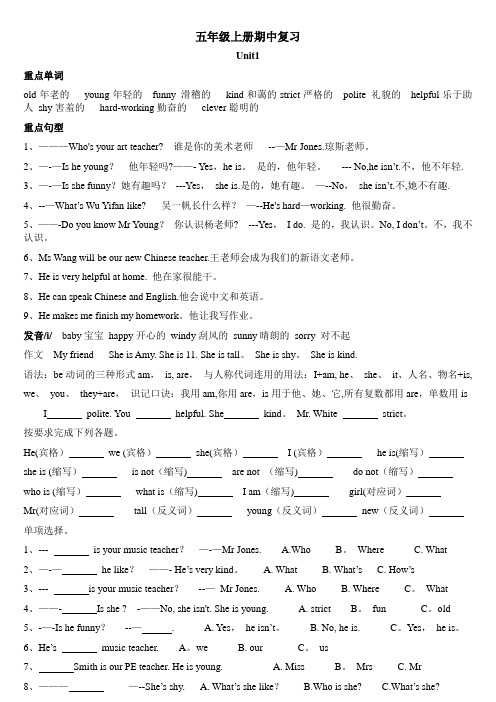
五年级上册期中复习Unit1重点单词old年老的young年轻的funny 滑稽的kind和蔼的strict严格的polite 礼貌的helpful乐于助人shy害羞的hard-working勤奋的clever聪明的重点句型1、———Who's your art teacher? 谁是你的美术老师--—Mr Jones.琼斯老师。
2、—-—Is he young?他年轻吗?——- Yes,he is。
是的,他年轻。
--- No,he isn’t.不,他不年轻.3、—-—Is she funny?她有趣吗?---Yes,she is.是的,她有趣。
—--No,she isn’t.不,她不有趣.4、--—What’s Wu Yifan like? 吴一帆长什么样?—--He's hard—working. 他很勤奋。
5、——-Do you know Mr Young?你认识杨老师? ---Yes,I do. 是的,我认识。
No, I don’t。
不,我不认识。
6、Ms Wang will be our new Chinese teacher.王老师会成为我们的新语文老师。
7、He is very helpful at home. 他在家很能干。
8、He can speak Chinese and English.他会说中文和英语。
9、He makes me finish my homework。
他让我写作业。
发音/i/baby宝宝happy开心的windy刮风的sunny晴朗的sorry 对不起作文My friend She is Amy. She is 11. She is tall。
She is shy。
She is kind.语法:be动词的三种形式am,is, are,与人称代词连用的用法:I+am, he、she、it、人名、物名+is, we、you、they+are,识记口诀:我用am,你用are,is用于他、她、它,所有复数都用are,单数用isI polite. You helpful. She kind。
PEP版小学英语五年级上册知识点汇总(全一册)
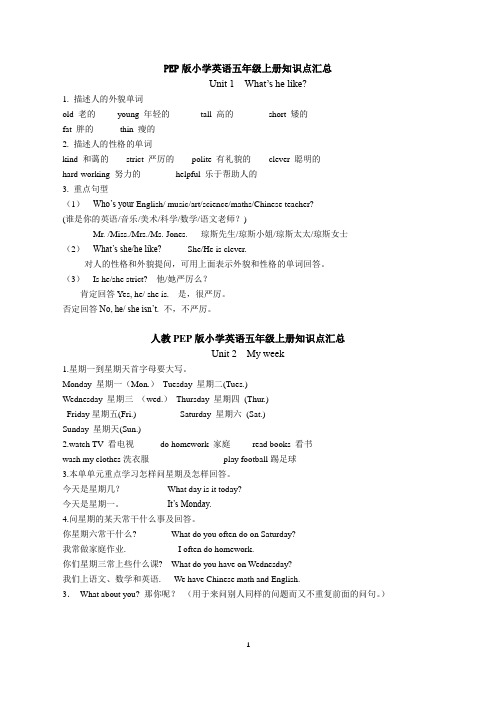
PEP版小学英语五年级上册知识点汇总Unit 1 What’s he like?1. 描述人的外貌单词old 老的young 年轻的tall 高的short 矮的fat 胖的thin 瘦的2. 描述人的性格的单词kind 和蔼的strict 严厉的polite 有礼貌的clever 聪明的hard-working 努力的helpful 乐于帮助人的3. 重点句型(1)---Who’s your English/ music/art/science/maths/Chinese teacher?(谁是你的英语/音乐/美术/科学/数学/语文老师?)---Mr. /Miss./Mrs./Ms. Jones. 琼斯先生/琼斯小姐/琼斯太太/琼斯女士(2)---What’s she/he like? ---She/He is clever.对人的性格和外貌提问,可用上面表示外貌和性格的单词回答。
(3)---Is he/she strict? 他/她严厉么?肯定回答Yes, he/ she is. 是,很严厉。
否定回答No, he/ she isn’t. 不,不严厉。
人教PEP版小学英语五年级上册知识点汇总Unit 2 My week1.星期一到星期天首字母要大写。
Monday 星期一(Mon.)Tuesday 星期二(Tues.)Wednesday 星期三(wed.)Thursday 星期四(Thur.)Friday星期五(Fri.) Saturday 星期六(Sat.)Sunday 星期天(Sun.)2.watch TV 看电视do homework 家庭read books 看书wash my clothes洗衣服play football踢足球3.本单单元重点学习怎样问星期及怎样回答。
今天是星期几?What day is it today?今天是星期一。
It’s Monday.4.问星期的某天常干什么事及回答。
pep人教版小学五年级英语上册复习提纲 (1)
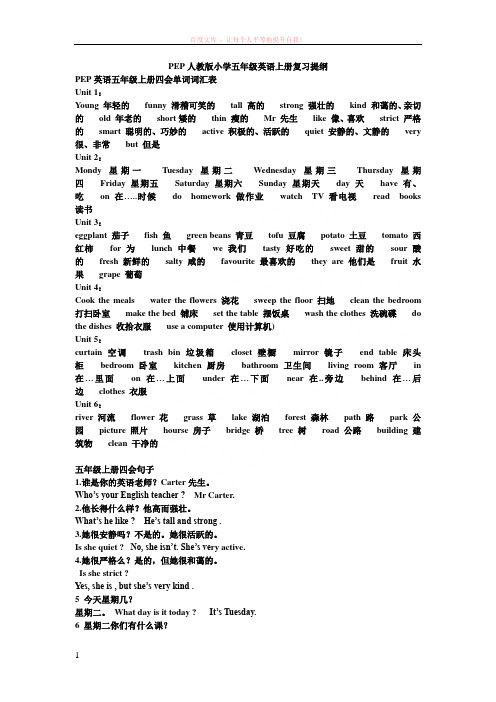
PEP人教版小学五年级英语上册复习提纲PEP英语五年级上册四会单词词汇表Unit 1:Young 年轻的funny 滑稽可笑的tall 高的strong 强壮的kind 和蔼的、亲切的old 年老的short矮的thin 瘦的Mr 先生like 像、喜欢strict 严格的smart 聪明的、巧妙的active 积极的、活跃的quiet 安静的、文静的very 很、非常but 但是Unit 2:Mondy 星期一Tuesday 星期二Wednesday 星期三Thursday 星期四Friday 星期五Saturday 星期六Sunday 星期天day 天have 有、吃on 在…..时候do homework 做作业watch TV 看电视read books 读书Unit 3:eggplant 茄子fish 鱼green beans 青豆tofu 豆腐potato 土豆tomato 西红柿for 为lunch 中餐we 我们tasty 好吃的sweet 甜的sour 酸的fresh 新鲜的salty 咸的favourite 最喜欢的they are 他们是fruit 水果grape 葡萄Unit 4:Cook the meals water the flowers 浇花sweep the floor 扫地clean the bedroom 打扫卧室make the bed 铺床set the table 摆饭桌wash the clothes 洗碗碟do the dishes 收拾衣服use a computer 使用计算机)Unit 5:curtain 空调trash bin 垃圾箱closet 壁橱mirror 镜子end table 床头柜bedroom 卧室kitchen 厨房bathroom 卫生间living room 客厅in 在…里面on 在…上面under 在…下面near 在..旁边behind 在…后边clothes 衣服Unit 6:river 河流flower 花grass 草lake 湖泊forest 森林path 路park 公园picture 照片hourse 房子bridge 桥tree 树road 公路building 建筑物clean 干净的五年级上册四会句子1.谁是你的英语老师?Carter先生。
人教版(PEP)五年级上册Unit2Myweek复习课件

27.(202X秋·广东阳江·五年级统考期末)Chen Jier_e_ad_s___(read) books in the park on weekends.
20.(202X秋·河南信阳·五年级统考期中)Do you often wash_a_r_e___(you) clothes on XXXdays? 解析:your是形容词性物主代词,后面+名词。 21.(202X秋·河南信阳·五年级统考期中)Lily oftenw__at_c_h_es_(watch) TV on the weekend. 解析:主语是Lily,属于第三人称单数,动词watch需要改成watches。 22.(202X秋·山东临沂·五年级校考期中)—Do you often wa_s_h____ your clothes on the w_e_ek_e_n_d_? —Yes, I do. 解析:Do提前,后面动词用原形,短语on the weekend。
23.(202X秋·山西吕梁·五年级统考期中)Sometimes,I_w_a_t_ch__ (watch) TV on the weekend.
解析:主语是I,属于第一人称,动词用原形。 24.(2023秋·山西忻州·五年级统考期末)He_d_o_e_sn_’_t (not) have maths on Mondays.
( A )9.(202X秋·广东梅州·五年级统考期中)Do you often play football ______ Saturdays?
A.on
B.at
C.in
解析:短语搭配on+星期。
( B )10.(202X秋·江西上饶·五年级统考期中)They often play_______ football on Saturdays.
人教版PEP五年级英语上册全册单元复习题

人教版PEP五年级英语上册全册单元复习题1. Unit 1: Greetings and Introduction- Practice introducing yourself in English.- Match the greetings with the corresponding pictures.- Fill in the blanks with the correct sentences.- Write a short conversation using greetings and introductions.2. Unit 2: School Life- List five school subjects in English.- Write the English words for different classroom objects.- Match the pictures with the school subjects.- Fill in the blanks with the correct words related to school.- Write a paragraph about your favorite subject.3. Unit 3: Daily Routines- Write the daily routine activities in English.- Match the pictures with the daily routines.- Fill in the blanks with the correct verbs.- Write a short diary entry about your day.4. Unit 4: Weather and Seasons- Write the names of different weather conditions.- Identify the seasons based on weather descriptions.- Fill in the blanks with the correct words related to weather.- Write a sentence for each season describing what you like to do.5. Unit 5: Family and Friends- Write the names of family members in English.- Match the pictures with the family relationships.- Fill in the blanks with the correct words related to family.- Write a short paragraph about your best friend.6. Unit 6: Food and Drinks- Write the names of different food and drinks in English.- Match the pictures with the names of food and drinks.- Fill in the blanks with the correct words related to food and drinks. - Write a short recipe for your favorite dish.7. Unit 7: Hobbies and Leisure Activities- Write the names of different hobbies and leisure activities in English.- Match the pictures with the names of hobbies and leisure activities.- Fill in the blanks with the correct words related to hobbies and leisure activities.- Write a paragraph about a fun activity you did recently.8. Unit 8: Places in the Neighborhood- Write the names of different places in the neighborhood in English.- Match the pictures with the names of the places.- Fill in the blanks with the correct words related to places in the neighborhood.- Write a short paragraph about a place you visited recently.9. Unit 9: Transportation and Directions- Write the names of different transportation modes in English.- Match the pictures with the names of transportation modes.- Fill in the blanks with the correct words related to transportation and directions.- Write a short dialogue giving and asking for directions.10. Unit 10: Festivals and Celebrations- Write the names of different festivals and celebrations in English.- Match the pictures with the names of festivals and celebrations.- Fill in the blanks with the correct words related to festivals and celebrations.- Write a short paragraph about a festival or celebration you enjoyed.以上是《人教版PEP五年级英语上册全册单元复习题》的内容概要,包括每个单元的重点内容和练习题目。
2017新人教版PEP五年级英语上册复习资料

2017新人教版PEP五年级英语上册复习资料Unit 1 My School LifeThis unit focuses on introducing school life vocabulary and phrases to students. Through various activities, students learn about different subjects, school facilities, and daily routines. Let's take a look at the key points covered in this unit.1. School SubjectsIn this section, students are introduced to different subjects they study at school, such as Chinese, English, math, science, and PE. They learn how to ask and answer questions about their favorite subjects, as well as express their opinions.2. Classroom ObjectsStudents learn the names of various objects they can find in the classroom, such as desks, chairs, blackboards, and books. Through interactive games and exercises, they practice describing the location of these objects and learn prepositions of place.3. Daily RoutinesThis section focuses on teaching students how to talk about their daily routines. They learn how to use simple present tense verbs to describe actions they do every day, such as 'get up,' 'brush teeth,' 'have breakfast,' 'go to school,' and 'come back home.' Through discussions and role-plays, they practice using these phrases in meaningful context.4. School FacilitiesStudents are introduced to different facilities they can find at school, such as the library, playground, computer room, and art room. They learn new vocabulary related to these places and practice asking and answering questions about them. This section also provides opportunities for students to give directions using simple prepositions, such as 'next to,' 'behind,' and 'opposite.'5. School LifeThis section focuses on encouraging students to talk about their school life experiences. They learn new words and phrases related to school activities, such as 'science fair,' 'sports day,' 'morning assembly,' and 'English corner.' Through group discussions and presentations, students share their own experiences and talk about their favorite school events.Unit 2 My FamilyThis unit introduces vocabulary and phrases related to family members, their roles, and activities. Students learn how to talk about their own families and ask questions about others. Let's explore the key points covered in this unit.1. Family MembersStudents are introduced to different family members, such as parents, grandparents, siblings, and relatives. They learn how to use possessive pronouns to describe family relationships and practice asking and answering questions about their own families.2. Family Roles and ActivitiesIn this section, students learn about different roles family members play at home, such as father, mother, brother, sister, and grandparents. They also learn about daily activities they do together, such as cooking, cleaning, playing games, and watching movies. Through discussions and role-plays, students share their own experiences and talk about their favorite family activities.3. My Family TreeStudents learn how to create a simple family tree to represent their own family members. They practice using possessive pronouns and present tense verbs to describe the relationships and activities of each family member. This section encourages students to share their family tree with their classmates and talk about their family members.4. Family Traditions and CelebrationsIn this section, students learn about different family traditions and celebrations, such as birthdays, New Year's Eve, and Spring Festival. They learn new vocabulary related to these festivities and practice asking and answering questions about how they celebrate these occasions with their families. Students also have the opportunity to share their own family traditions and celebrations.Unit 3 My FriendsThis unit focuses on introducing vocabulary and phrases related to friends, friendship, and activities with friends. Students learn how to describe their friends and talk about their favorite activities together. Let's explore the key points covered in this unit.1. Describing FriendsStudents learn how to describe their friends using adjectives, such as tall, short, thin, and kind. They practice using sentence patterns to talk about their friends' physical appearance, personality traits, and hobbies. Through interactive activities, students learn to appreciate diversity and respect their friends' differences.2. Likes and DislikesIn this section, students learn how to express their likes and dislikes. They learn new vocabulary related to hobbies and activities, such as playing basketball, painting, dancing, and reading. Through discussions and role-plays, students practice asking and answering questions about their friends' preferences.3. Activities with FriendsStudents learn how to talk about their favorite activities with friends. They learn new verbs related to different activities, such as playing games, going swimming, watching movies, and having picnics. Through group discussions and presentations, students share their favorite activities and talk about why they enjoy doing them with their friends.4. Being a Good FriendThis section focuses on teaching students the qualities of a good friend. They learn about kindness, honesty, cooperation, and respect. Students practice using sentence patterns to give advice and support their friends. Through role-plays and real-life scenarios, they learn how to be good friends to others.Unit 4 My HobbiesThis unit introduces vocabulary and phrases related to hobbies and interests. Students learn how to talk about their own hobbies and ask questions about others. Let's explore the key points covered in this unit.1. Hobbies and InterestsStudents learn how to talk about different hobbies and interests, such as playing soccer, drawing, singing, and collecting stamps. They practice asking and answering questions about their favorite hobbies and learn new vocabulary related to these activities.2. Everyday HobbiesIn this section, students learn about hobbies they can do every day, such as reading, watching TV, and playing games. They learn new verbs and phrases related to these hobbies and practice talking about their daily routines and free time activities.3. Exploring New HobbiesStudents are encouraged to explore new hobbies and interests. They learn new vocabulary related to various activities, such as cooking, gardening, photography, and playing musical instruments. Through discussions and presentations, students share their experiences of trying new hobbies and talk about their interests.4. My Hobby PresentationThis section provides students with the opportunity to create a presentation about their favorite hobby. They learn how to structure apresentation, use visual aids, and deliver their speech confidently. Through peer feedback and evaluation, students improve their presentation skills and learn to appreciate different hobbies and interests.Unit 5 My DayThis unit focuses on introducing vocabulary and phrases related to daily activities and time expressions. Students learn how to talk about their daily routines and schedule. Let's explore the key points covered in this unit.1. Daily ActivitiesStudents learn how to talk about their daily activities, such as waking up, eating breakfast, going to school, doing homework, and going to bed. They practice using simple present tense verbs and time expressions to describe their routines.2. Time ExpressionsIn this section, students learn how to use different time expressions to talk about specific times of the day, such as 'in the morning,' 'in the afternoon,' 'in the evening,' 'at night,' and 'at noon.' They practice using these expressions to create sentences and describe their activities at different times.3. My ScheduleStudents learn how to create a daily schedule to plan their activities. They practice using time expressions and verbs to describe their planned activities and learn how to talk about their schedule with others. This section encourages students to be organized and manage their time effectively.4. Time for FunIn this section, students learn how to talk about their favorite leisure activities and free time. They learn new vocabulary related to hobbies, sports, and entertainment. Through discussions and role-plays, students share their favorite leisure activities and talk about how they spend their free time.These are the key points covered in the 2017 New Edition PEP Grade 5 English textbook. By revising and practicing these topics, students will develop their language skills and enhance their understanding of the English language. Remember to review the vocabulary, practice speaking and writing, and engage in interactive activities to reinforce your learning.。
新人教版PEP五年级英语上册各单元重点知识归纳

新人教版PEP五年级英语上册各单元重点知识归纳Unit 1: Hello!- Greetings: Hello, Hi, Good morning, Goodbye- Introducing oneself: My name is..., I'm..., Nice to meet you- Numbers: 1-20- Classroom objects: desk, chair, book, pen, pencil, rulerUnit 2: My Schoolbag- Stationery items: eraser, pencil sharpener, glue, crayons, scissors - Colors: red, blue, green, yellow, black, white- Personal pronouns: I, you- Plural forms of nouns: pens, pencils, rulers, booksUnit 3: My Friends- Adjectives: happy, sad, tall, short, thin, fat- Describing appearance: He/She is..., They are...- Possessive adjectives: my, your, his, her, their- Talking about friends: I have a friend. His/Her name is... Unit 4: My Home- Rooms in a house: living room, bedroom, kitchen, bathroom - Prepositions: in, on, under, near- Furniture: sofa, bed, table, chair- Demonstrative pronouns: this, that, these, thoseUnit 5: Food and Drinks- Food items: apple, banana, orange, sandwich, hamburger- Drinks: water, milk, juice, tea- Expressing likes and dislikes: I like..., I don't like...- Question words: What, Where, WhoUnit 6: At the Market- Fruit: grapes, strawberries, watermelon, pineapple- Vegetables: carrot, tomato, onion, potato- Countable and uncountable nouns: an apple, some bananas, a glass of milk- Shopping phrases: How much is..., I want...Unit 7: In the Park- Outdoor activities: play football, fly a kite, ride a bicycle- Weather: sunny, rainy, windy- Present continuous tense: I am playing, He is running- Adverbs: slowly, quicklyUnit 8: My Family- Family members: father, mother, brother, sister- Describing relationships: This is my..., He/She is my...- Possessive 's: Dad's book, Mom's bag- Expressing family activities: We have dinner, We go swimmingUnit 9: At the Zoo- Animals: panda, lion, elephant, giraffe, monkey, tiger- Describing animals: big, small, tall, short, fast, slow- Present simple tense: Lions eat meat, Monkeys swing on trees - Plural forms of animals: pandas, monkeys, tigersUnit 10: At the Farm- Farm animals: cow, horse, pig, chicken, goat- Animal sounds: moo, neigh, oink, cluck, baa- Expressing abilities: I can..., He/She can...- Prepositions of location: in front of, behindUnit 11: Nature Park- Nature elements: river, tree, flower, grass, mountain- Adverbs of frequency: always, usually, sometimes, never- Asking about preferences: Do you like..., Which do you like...Unit 12: Let's Celebrate!- Festivals: Christmas, Spring Festival, Easter, Halloween- Activities during festivals: decorate, light candles, give gifts - Recounting past events: Last year, I..., We...。
- 1、下载文档前请自行甄别文档内容的完整性,平台不提供额外的编辑、内容补充、找答案等附加服务。
- 2、"仅部分预览"的文档,不可在线预览部分如存在完整性等问题,可反馈申请退款(可完整预览的文档不适用该条件!)。
- 3、如文档侵犯您的权益,请联系客服反馈,我们会尽快为您处理(人工客服工作时间:9:00-18:30)。
1新版PEP 五年级上册知识点总结Unit 1 What ’s he like?old 老的,年纪大的young 年轻的funny 滑稽的可笑的kind 体贴的strict 严格的polite 有礼貌的 shy 羞怯的,怕生的 helpful 有用的 clever 聪明的,聪颖的 hard-working 工作努力的,辛勤的 music 音乐 art 美术 science 科学 English 英语 maths/math 数学 Chinese 语文,中文 sometimes 有时,间或 robot 机器人 speak 说讲(某种语言)1. —Who’s your art teacher? 谁是你的美术老师? —Mr. Jones.琼斯老师。
2. —Is he young? 他年轻吗?—Yes, he is. 是的,他年轻。
—No, he isn’t.3. —What’s Wu Yifan like ? 吴一帆怎样? —He’s hard -working. 他很勤奋。
4. Ms Wang will be our new Chinese teacher. 王老师会成为我们的新语文老师。
5. He is very helpful at home . 他在家很能干。
6. Robin is short but strong. 罗宾个子矮,但是身体强壮。
7. He can speak Chinese and English . 他会说中文和英语。
8. He他让我完成我的作业。
字母y 在单词中的发音:1、双音节或多音节词末发[ i ]。
例:bab y happ y windy sunn y sorr y cand y man y famil y part y婴儿 开心的 有风的 晴朗的 对不起 糖果 许多 家庭 聚会课外补充:2、y 在单音节词末发[ ai ] 例:b y 乘坐 m y 我的 wh y 为什么 cr y 哭 fl y 飞1、询问他人的外貌或性格:-What’s he/she like? - He/She is kind/…2、一般疑问句的问与答:—Is he/she…?—Yes, he/she is. —No, he/she isn’t.—Do you know …? —Yes, I do. —No, I don ’t3、be 动词的三种形式am, is, are 与人称代词连用的用法:I + am, He, she, it ,人名、物名+ is We, you, they + are 4、and 和but 的区别:and “和,与”,表并列关系 He is . 他又高又瘦。
but “但是”,表转折关系 He is . 他个子矮,但是身体强壮。
Unit 2My weekSunday (Sun.) 周日Monday (Mon.) 周一Tuesday(Tue./Tues.)周二Wednesday(Wed./Weds.) 周三Thursday (Thur./Thurs.) 周四Friday (Fri.) 周五Saturday (Sat.) 周六weekend 周末wash my clothes 洗衣服watch TV 看电视do homework 做作业read books 看书play football 踢足球on the weekend 在周末play sports/do sports 做体育运动listen to music 听音乐play ping-pong 打乒乓球1.on Thursday星期四你们上什么课?—I have math, English and music. 我们上数学、英语和音乐课。
2. 爷爷,星期四你要做什么?—I have a cooking class with your grandma. 我和你奶奶去上烹饪课。
3. —Do you often read books in this park? 你经常在这个公园看书吗?—Yes, I do.是的—No, I do n’t.不是4. Look at my picture. 看我的图片。
5. You look tired. 你看起来很累。
6. You shouldplay sports every day. 你应该每天做运动。
字母组合ee, ea在单词中的的发音:[ i: ]例:f ee t b ee f m ee t s ee f ee d t ea r ea d ea t rep ea t脚牛肉遇见看见喂养茶阅读吃重复注:1、ee组合绝大部分发长音[ i: ],只有少部分发短音[ i ],如:coffee 咖啡2、ea字母组合除了发[ i: ],还有可能发[ e ]等发音,如:bread 面包,或者发[ ei ],如:great 好极了1、询问做什么事/活动:—What do you do …? —I often play ping-pong…询问星期几上什么课:—What do you have on…? —We have English class…2、一般疑问句的问与答:—Do you often read books? —Yes, I do. —No, I don’t.3、,如:on Monday/Tuesday…课外’clock 在十二点整补充:,如:in 2014 在2014年in the morning/afternoon/evening 4、play + 球类、棋类、娱乐活动,如:play football/ping-pong补充:play + the + 乐器(第四单元知识),如:play the pipa/piano/violin…Unit 3What would you like? 重点单词ice cream 冰淇淋hamburger 汉堡包tea 茶sandwich 三文治salad 沙拉fresh 新鲜的healthy 健康的delicious 美味的;hot 辣的;辛辣的sweet 含糖的;甜的hungry 饿的thirsty 渴的;口渴的favourite 特别喜爱的food 食物drink 喝;饮carrot 胡萝卜chicken 鸡肉onion 洋葱milk 牛奶bread 面包beef noodles 牛肉面fish sandwich 鱼肉三明治tomato soup 西红柿汤重点句子1.—What would you like to eat? 你想吃什么?—A sandwich, please. 请给我一个三明治。
—What would you like to drink? 你想喝什么?—I’d like some water. 我想喝点水。
2. —What’s your favourite food?你最喜欢吃什么食物?—Noodles. They are delicious.面条。
面条很好吃。
3. My/His /Her favourite food is fish. 我/他/她最喜欢的食物是鱼。
4. I’m hungry/thirsty. 我饿/渴了。
5. I don’t like beef but chicken is OK. 我不喜欢牛肉但是鸡肉也可以。
6. Onions are my favourite vegetable. 洋葱是我最喜欢的蔬菜。
7. I like vegetables but not carrots. 我喜欢吃蔬菜但不喜欢胡萝卜。
语音字母组合ow在单词中的发音:[ au ]例:[ au ] c ow奶牛fl ow er 花w ow哇d ow n 向下h ow如何,怎样n ow现在sl ow慢的sn ow雪yell ow黄色wind ow窗户sn ow y 下雪的tomorr ow明天重点知识及语法1、询问想要吃/喝什么:—What would you like to eat/drink? —I’d like…2、询问最喜欢的事物:—What’s your favourite food/vegetable/…? —My favourite food/…is…/I like…3、名词复数的规则变化:(1)直接加s;(2)以s, x, sh, ch结尾的,加es,如,bus es box es sandwich es(3)以o结尾,有生命的加es,如,potato es tomato es;无生命的加s,如,photo s piano s zoo s (4)以辅音加y结尾,改y为i再加es,如,famil ies bab ies;以元音加y结尾,直接加s,如,boy s day s (5)以f或fe结尾,改f为v再加es,如knife-kni ves小刀leaf-lea ves树叶4、some+可数/不可数名词例:some apple s(可数)some water/rice/juice/bread/…(不可数)课外补充:不可数名词(词后不可以加-s/es,所接动词用单数is /V-s/es)液体water milk tea orange(桔汁)coke juice 气体air(空气)食物food rice bread fruit 肉类meat(肉)fish beef chi cken五年级上册期末复习资料paper(纸)time music weather(天气)rain snow moneyUnit 4 What can you do?dance 跳舞sing English songs唱英文歌play the pipa 弹琵琶do kung fu 打功夫draw cartoons 画漫画swim 游泳speak English 说英语cook 烹饪,烹调play basketball 打篮球play ping-pong 打兵乓球draw pictures 画画clean the classroom打扫教室1. We’ll have an English party next Tuesday! 我们下周二将举行英语派对。
2. —What can you do for the party? 你能为派对做些什么呢?—I can sing English songs. 我能唱英文歌。
3. How/What about you? 你呢?4. Can you do any kung fu? 你会打功夫吗—Yes, I can. 是的,我会。
—No, I can’t.5. No problem. I can help you. 没问题。
我会帮你。
6. I can play ping-pong, but I can’t swim. 我会打乒乓球,但我不会游泳。
